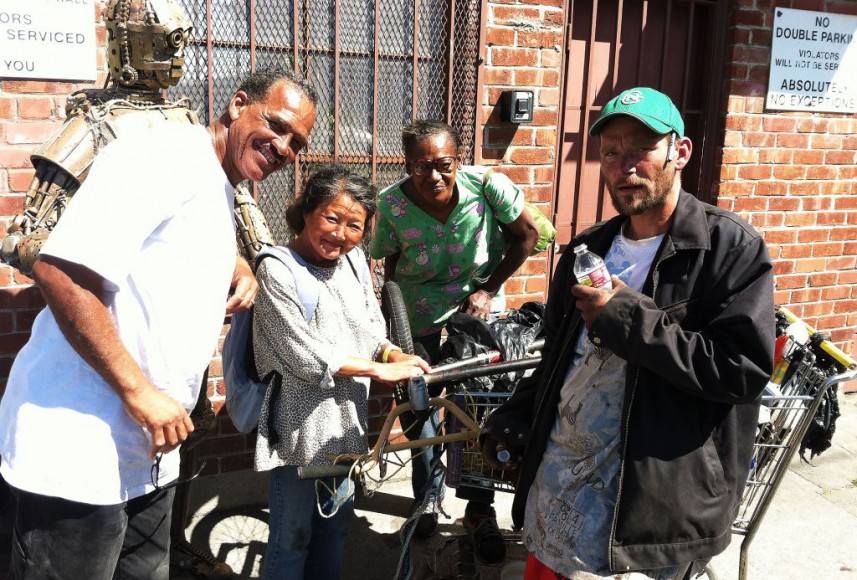A historic number of CAAM-affiliated Asian American documentary filmmakers have received nominations for the News and Documentary Emmy awards. Among the nominees are five CAAM-funded filmmakers: Renee Tajima-Peña for No Más Bebés, Hemal Trivedi and Mohammed Ali Naqvi for Among the Believers, Geeta V. Patel for Meet the Patels, Chihiro Wimbush and Amir Soltani for Dogtown Redemption, and Nanfu Wang for Hooligan Sparrow. The awards ceremony takes place October 5, 2017.
“This is the first time where people we’ve funded and worked with received this many nominations in one year,” said CAAM’s director of programs Donald Young, who oversees documentary production.
CAAM was formed in 1980 to support the development of Asian American documentary filmmakers and production of Asian American films. Filmmakers can receive funding through CAAM’s Media Fund, receiving between $15,000 $50,000 support individual projects. Many of the completed films premiere at CAAMFest. Young and CAAM Executive Director Stephen Gong often act as Executive Producers, seeing each project from beginning to the end and playing a crucial role in connecting filmmakers with the PBS and World Channel broadcast world (they were not EPs in the films nominated this year). Most documentaries take four or more years to complete, and Young and Gong are there along the way to consult, give feedback, and review multiple cuts of the documentaries before they air.
Formerly the National Asian American Telecommunications Association (NAATA), CAAM was born from a grant co-written by Renee Tajima-Pena, who at the time was a budding filmmaker at New York’s Asian CineVision.
Now a well-respected and seasoned filmmaker, Tajima-Peña co-directed the seminal Who Killed Vincent Chin? documentary with Christine Choy and has received her first Emmy nomination for No Más Bebés . She said she’s thrilled to see this year’s nominees, representing so many diverse films and filmmakers and so many on public media. “We elevate the system’s mission of diversity, quality and innovation,” she said.
“Like generations of Asian American filmmakers since its founding, CAAM has been my rock. I’ve screened at CAAMFest, the Media Fund helped me finish several films, it’s one of the first calls we make when shit hits the fan and we need to mobilize the community,” she added.”
Tajima-Peña says that hopefully, the nominations means that Asian American documentary filmmakers are finally breaking through the glass ceiling.
“It is significant, and hopefully a trend, not an aberration,” she said. “When Who Killed Vincent Chin? was nominated for an Academy Award, there were three films by Asian American directors nominated—each with Asian/Asian American subject matter.” In 1989 when Who Killed Vincent Chin? was nominated for an Oscar, Mira Nair’s Salaam Bombay! was in the running for Best Foreign Language film, and Lise Yasui produced Family Gathering was in the Short Documentary category. “But that was an anomaly. I hope, though, that there will be more and more films recognized that are made by and about Asian Americans.”
For Hemal Trivedi, she decided to make the provocative Among the Believers, which offers rare insight into the ideology shaping Pakistan and the Muslim world, when she lost a friend in the Mumbai terrorist attacks in 2008. Together, with Pakistani American filmmaker Mohammed Ali Naqvi, they filmed for 7 years. The film has played in over 70 countries and has won over 30 awards. It has been shown by the United Nations and US State Department.
Trivedi hopes that the nominations and increasing visibility of Asian and Asian American stories will inspire younger Asian Americans to enter into creative fields. “Although Asian Americans tend to be exceptionally good academically, they typically tend to enter the field of applied sciences. Even I was forced to specialize in Microbiology in college. I had to fight really hard to become a filmmaker. But being in media is equally important, because media influences the culture and the government. We Asian Americans need to have a significant presence in mainstream media, because we need to control our own narratives.”
Chihiro Wimbush, who co-directed Dogtown Redemption with Amir Soltani, says that CAAM gave him his first break as a filmmaker. He began attending the film festival, formerly the San Francisco International Asian American Film Festival, in the 90s and held down his first film-related job with the festival a decade ago.
“After the festival ended, CAAM gave me my first break with the opportunity to work on a narrative film they were producing for Wayne Wang, which was followed by more CAAM narrative film projects for Rich Wong and HP Mendoza, and then eventually numerous opportunities in CAAM projects and documentary films beginning with Don’t Lose Your Soul and continuing most recently with Changing Season and The People’s Hospital,” Wimbush told CAAM. “So it is no exaggeration at all to say that I owe the start of my career and much of my development as a filmmaker to CAAM.”
Wimbush began working on Dogtown Redemption nine years ago—it was his first foray into the documentary genre. “Often I looked to the tenacity of our subjects for inspiration: the recyclers who would go out all day and night to dig through trash for hidden treasures,” Wimbush said. “So here we are after nearly a decade, the impossible dream not only realized but even exceeded with this Emmy nomination. It shows that faith can be rewarded, and if you never give up, anything is possible.”
“We’re so proud of their work and being invested in their journey,” Young said. “This is what we do. We’ve been going on their journey with them for years.”
+ + +
Momo Chang is CAAM’s Content Manager.









1 Comment